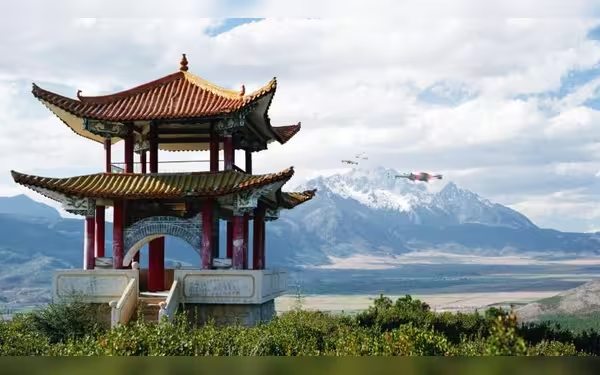Sunday, November 17, 2024 12:22 AM
Insights From China: Cultural Lessons and Professional Growth
- Urumqi showcases honesty and hospitality among locals.
- Beijing leads in environmental restoration and air quality.
- China's digital payment systems enhance economic efficiency.
 Image Credits: thefridaytimes
Image Credits: thefridaytimesExplore cultural insights and professional growth lessons from China, highlighting hospitality, environmental strides, and digital payment systems.
China, often referred to as the "Middle Kingdom," is a land of rich history, diverse cultures, and remarkable advancements. Recently, a professional training program in Urumqi, the capital of Xinjiang province, provided a unique opportunity to explore this fascinating country. The experience was not just about enhancing professional skills; it was a deep dive into a culture that is vastly different from many others, including our own in Pakistan.
Upon arrival in Urumqi, the vibrant energy of the city was immediately noticeable. Over the course of two weeks, the program involved navigating bustling streets, engaging in hands-on workshops, and building connections with local colleagues. This journey was filled with new experiences that transformed both personal and professional perspectives.
One of the most striking aspects of Xinjiang was the absence of homelessness, even during late-night outings. The warmth and friendliness of the local people were evident in various interactions. For instance, when a phone was accidentally left behind in a shop, the shopkeeper promptly returned it, showcasing a level of honesty that was both surprising and heartwarming. Similarly, a colleague who dropped a significant amount of money at a restaurant was quickly assisted by a waiter who returned the lost envelope. Such acts of kindness left a lasting impression, highlighting the integrity and hospitality of the people.
Beijing, the capital city, offered another layer of insight. Known for its rapid advancements, Beijing has made significant strides in environmental restoration. The city has successfully improved its air quality and managed to restore low temperatures, becoming the second city in the world to achieve such a feat after London. A visit to the Great Wall of China, one of the Seven Wonders of the World, was a highlight, providing breathtaking views and a sense of historical significance.
Experiential learning continued with a visit to a Xinjiang Theatre, where performances showcased the rich cultural tapestry of China. The emotional depth of the performances resonated with the audience, deepening appreciation for the country's diverse heritage.
However, challenges were also present, particularly the language barrier in Urumqi. Communication difficulties arose, especially when taking cabs to various markets. Fortunately, many shopkeepers were multilingual, easing interactions in commercial settings. Another notable observation was the high percentage of female shop owners, with over 90% of shops run by women. This significant female participation reflects progressive strides in gender equality within the business sector.
Throughout the experience, several cultural practices stood out. Punctuality is a core value in Chinese society, contrasting with the more relaxed approach often seen in Pakistan. The cleanliness of the streets, including small alleys, was impressive, with no litter in sight. Additionally, construction sites were well-managed, minimizing noise and pollution—practices that could greatly benefit urban areas in Pakistan.
China's early adoption of electric vehicles has also contributed to improved environmental conditions. Emulating such practices could enhance energy efficiency and productivity in our own communities. The lessons learned from this training program are invaluable. By adopting punctuality and proactive planning, we can enhance our productivity and efficiency.
Moreover, China's arms-free policy has significantly reduced violent extremism and terrorism. Implementing similar measures in Pakistan could yield substantial benefits. The widespread use of digital payment systems in China, even among small vendors, is another area worth exploring. Such cashless transactions could help create a more documented economy and improve tax collection.
Ultimately, the values of honesty and integrity, as demonstrated by the Chinese people, are essential for fostering a culture of trust. By promoting these values within our society, we can redefine our heroes and build a stronger community. The insights gained from this journey to the Middle Kingdom serve as a reminder of the potential for growth and improvement in our own lives and society.













